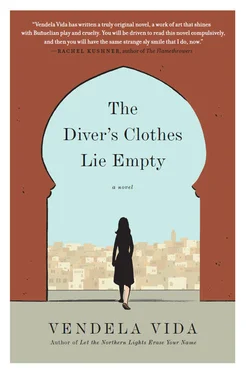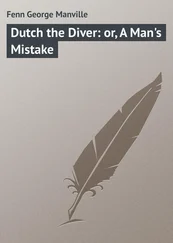“No, thank you,” you say.
“Pretty lady like you, you should take photographs of you. Here, I take photograph of you.”
“No,” you say. “Please don’t. Please leave me alone.”
He looks to his left, then to his right before pulling out the camera. It’s a Pentax, not so different from the one you owned. But this one has a bigger lens and looks more expensive.
You do not want a camera, but you want him to go away.
“How much?” you say.
“For you, lady, three hundred and sixty dirhams.”
“Excuse me?” you say. If you’re doing your math right, it’s only forty dollars.
“Okay. Two hundred and sixty dirhams.” Thirty dollars.
“Okay,” you say. You need him to go away.
You turn from him, and extract the money from your bra. You make the exchange quickly, and he is gone, and you are once again alone in the small square.
You hold the camera in your hands — it’s heavy, a professional’s camera. You turn it on. The first few photos are of a woman with strawberry-blond hair. She’s in a Moroccan city — Fez? She’s in her late thirties, with soft wrinkles around her eyes when she smiles, which she does a lot — it’s a natural, unforced smile. In most of the photos she wears loose pants and a tight T-shirt. Her clothes don’t look American — maybe she’s Dutch, or Danish. You continue rewinding. Now she’s standing in front of what looks like a Gaudí balcony in Barcelona. Her arms are outstretched, as though to say, Look where I am!
In many of the photos she’s posing with her son. Her son is skinny and tall, and partial to wearing the same soccer shirt every day. He’s about eleven, you guess, with freckles scattered just below his blue eyes. You flip through more photos of this woman’s life. You don’t see a father or husband; it’s just a mother and son on a trip. In one photo, they’re both eating bright green ice cream from cones and the woman is laughing and licking her wrist — the ice cream melted and she’s cleaning it off. In another, her son is posing in a museum, in front of a painting of a mournful-looking boy. The son is imitating the serious look of the boy in the painting, but the son can’t contain himself — you see a smile emerging.
You scroll through hundreds of photos, until you’re back to the first. In this inital photo, the woman and her son are at a European airport, their luggage beside them on the curb. The boy is standing in front of his mother, and her hands are placed casually on his shoulders. You zoom in. The gesture is protective but not possessive.
Something about these photographs, and this one in particular, gives you a sense of peace. You feel the familiar blue wave of calm take you over.
“That’s a good one,” a voice behind you says.
You jump.
“So sorry,” says the man. He’s in his early forties, with graying blond hair, and speaks with an accent you can’t place. “I didn’t mean to surprise you. I just wonder if you’re a photographer.”
He’s wearing a heavy Nikon camera on a strap around his neck. He’s thin and tall, his hair a little long but still respectably cut. You’re angry with him for approaching you like that, for getting so close. People don’t do that here in Morocco. He should know this.
“Are you a professional?” he asks, looking at your camera.
“I just bought it,” you say.
“You should put a strap on it,” he says. “Or keep it hidden. I’m traveling with a bunch of journalists and photographers, and one of them had their camera stolen the other day.”
You’re suddenly interested. “You’re with the press pool?”
“Yes,” he says, surprised you know.
“I saw your vans park beside our bus. What are you covering exactly?”
“We’ve been going all over North Africa with this Nigerian politician. Kind of fun. Most of us are bloggers, a random bunch from all over — I’m from Zurich. Some of us are pros, others amateurs. . it doesn’t seem to matter. We basically just document what he says and does. Show him being interested in local problems, being kind to poor people, that sort of thing. Turns out to be a very lovely man, so it makes the job easy.”
A car horn turns the Swiss man’s head.
“I should go,” he says. “I’m supposed to be back in the van soon. Lovely to meet you.”
But you haven’t introduced yourselves.
You stand in the middle of the small square, thinking about your options. There are ways out of your predicament. You can’t go back to the bus. And you can’t go to the embassy in Casablanca where Susan Sontag works, but there must be another embassy. Maybe in Rabat. You continue walking, and the streets grow gradually busier and more crowded. Eventually you spot a courtyard ahead of you. You walk toward it, hoping there’s a taxi stand.
When you emerge into the large plaza, the sun, which has been shielded from you by the narrow walkways, assaults you again. You’re momentarily blinded.
“There she is!” says a voice.
You look up. You see Hazel, Samantha, and the tour guide walking toward you.
“It was you, ” Samantha says.
“What?” you say.
“It was you all along,” says Hazel.
You scan your options. You can lie.
“You were the missing person we were looking for,” says the tour guide. He is angry but is trying to appear relieved.
The missing person. That’s who they think you are? So they don’t know that you’re the woman from Dellis Beach?
“I found a wig,” the tour guide says. “You must have changed seats. . I must have counted you twice, and you must have paid twice, once on each side of the bus! I didn’t realize you were someone else.”
“You’re the person you’ve been looking for!” Samantha says. “Isn’t that hilarious?”
You don’t answer. You hold the camera firmly.
The tour guide turns to Samantha. “It’s not so funny,” he says. “The police are at the bus. The tour company called them an hour ago when they thought we had an actual missing person.”
He looks at you accusingly.
“I had no idea,” you say. “I really didn’t. I’m sorry.”
“We just have to explain it to them and sign a few forms,” the tour guide says. “Then we go back to Casablanca.” The nuisance of it all appears to exhaust him. He looks like he’s frustrated that he studied history in school and now his job is counting people’s heads on buses. “Let’s go,” he says.
“I just need to use the bathroom,” you say.
You go into the bathroom of a café in the plaza and lock the door. You take a paper towel and run it under cool water, and press the towel to your forehead. You don’t want to face the stares of all the passengers on the bus, who will surely be angry that they spent hours of the tour looking for you. And worse: The police will ask for your name. They will ask for ID. They will want to know who you are.
You stare at your colorful basket, at the clothes you purchased for your mother this morning. You take off your white blouse and your black jeans and pull on the beaded blue and white djellaba. You remove your sandals and slip on the pointed orange babouche.
This is how you pictured yourself in Morocco. Not at a police station, not on a film set, but as a woman dressed to blend in while seeing North Africa for the first time. You pull the hood of the djellaba over your head.
You place the clothes you were wearing in the basket and throw it out the small window of the bathroom. You know the basket will be found in minutes, that someone will sell the clothes and sandals, or wear them.
You exit the bathroom. You see the tour guide, Hazel, and Samantha talking. You avoid them, walk far enough away from them that they don’t recognize you. You’re covered, you’re wearing different clothes. You imagine that from a distance you look like a Moroccan.
Читать дальше












